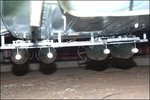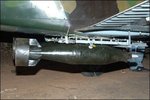FLYBOYJ
"THE GREAT GAZOO"
Rebels launch airstrike in Sri Lanka By KRISHAN FRANCIS, Associated Press Writer
58 minutes ago
COLOMBO, Sri Lanka - Rebels launched their first airstrike in the nearly quarter-century conflict with Sri Lanka's government, using at least one small plane to bomb an air base outside the capital Monday and killing three airmen, officials said.
Tamil Tiger rebels said the overnight raid was aimed at halting what they called "indiscriminate" aerial bombing of Tamil areas and warned of more attacks.
The rebels dropped three bombs from an aircraft that landed near the base's engineering section just before 1 a.m., the Defense Ministry said. No aircraft on the ground were damaged, but three airmen were killed and 16 injured, the ministry said. One bomb failed to explode.
The adjacent international airport was not hit.
Hours later, Hong Kong's Cathay Pacific Airways Ltd. said it was suspending all flights to Sri Lanka, raising concerns the attack could hurt the Indian Ocean nation's lucrative tourism industry.
Hours after Monday's air strike, government fighter planes bombed Tamil-held areas in northern Wanni district, the Tigers said in a statement e-mailed to The Associated Press. There were no causalities, said the statement.
The military did not immediately comment.
Sri Lankan officials said only one plane took part in the rebel attack, but Tamil Tiger spokesman Rasiah Ilanthirayan, insisted there were two, calling them "attack aircraft."
Both returned safely after bombing the Sri Lankan air force base, which he said was "the first major aerial attack by the Tigers.
"The attack is not only pre-emptive but also to safeguard our people from indiscriminate bombing by the (Sri Lanka Air Force)," Ilanthirayan said in a telephone interview with The Associated Press from the rebel's stronghold in Kilinochchi, a town in northern Sri Lanka. He added that air force attacks in northern Sri Lanka had killed and wounded civilians and damaged their property.
The rebels, formally known as the Liberation Tigers of Tamil Eelam, staged a devastating series of suicide bombings on the same air base and the international airport in July 2001, destroying six civilian jets, more than a dozen military planes and killing six security personnel.
A Western diplomat said the plane used Monday is believed to be a Czech-made Ziln Z-143, a single-propeller trainer that had been modified to carry bombs.
The rebels have long maintained an airstrip outside Kilinochchi — Sri Lanka's air force bombed it several times last year — and there have been persistent rumors that they had acquired aircraft.
But Monday's attack caught the Sri Lankans off guard, said the diplomat, who spoke on condition of anonymity to avoid harming his relations with the government.
Another Western diplomat, who also spoke on the condition of anonymity, said Sri Lankan officials think the aircraft appeared on the airport's radar about a half-hour before the attack, although air traffic controllers did not know what it was or that it was going to take part in an assault.
There were competing theories on how the aircraft had been smuggled onto the island.
Sri Lanka's former air force chief, retired Air Marshall Harry Goonetilleke, said the rebels might have broken the aircraft into parts for later reassembly. "You can get in parts of a whole small aircraft in five or six packets," he said.
But both diplomats said it was more likely planes had been flown in under Sri Lanka's limited radar coverage.
The Tigers launched their fight in 1983 to create an independent homeland for the country's 3.1 million minority Tamils after decades of discrimination by the majority Sinhalese. A Norway-brokered cease-fire signed in 2002 slowed the violence, but hostilities spiked again in late 2005, with more than 4,000 fighters and civilians killed in the last 15 months, according to European cease-fire monitors.
An estimated 65,000 people were killed in fighting before the cease-fire. While both sides have not officially withdrawn from the cease-fire, soaring violence has rendered the agreement valid only on paper.
58 minutes ago
COLOMBO, Sri Lanka - Rebels launched their first airstrike in the nearly quarter-century conflict with Sri Lanka's government, using at least one small plane to bomb an air base outside the capital Monday and killing three airmen, officials said.
Tamil Tiger rebels said the overnight raid was aimed at halting what they called "indiscriminate" aerial bombing of Tamil areas and warned of more attacks.
The rebels dropped three bombs from an aircraft that landed near the base's engineering section just before 1 a.m., the Defense Ministry said. No aircraft on the ground were damaged, but three airmen were killed and 16 injured, the ministry said. One bomb failed to explode.
The adjacent international airport was not hit.
Hours later, Hong Kong's Cathay Pacific Airways Ltd. said it was suspending all flights to Sri Lanka, raising concerns the attack could hurt the Indian Ocean nation's lucrative tourism industry.
Hours after Monday's air strike, government fighter planes bombed Tamil-held areas in northern Wanni district, the Tigers said in a statement e-mailed to The Associated Press. There were no causalities, said the statement.
The military did not immediately comment.
Sri Lankan officials said only one plane took part in the rebel attack, but Tamil Tiger spokesman Rasiah Ilanthirayan, insisted there were two, calling them "attack aircraft."
Both returned safely after bombing the Sri Lankan air force base, which he said was "the first major aerial attack by the Tigers.
"The attack is not only pre-emptive but also to safeguard our people from indiscriminate bombing by the (Sri Lanka Air Force)," Ilanthirayan said in a telephone interview with The Associated Press from the rebel's stronghold in Kilinochchi, a town in northern Sri Lanka. He added that air force attacks in northern Sri Lanka had killed and wounded civilians and damaged their property.
The rebels, formally known as the Liberation Tigers of Tamil Eelam, staged a devastating series of suicide bombings on the same air base and the international airport in July 2001, destroying six civilian jets, more than a dozen military planes and killing six security personnel.
A Western diplomat said the plane used Monday is believed to be a Czech-made Ziln Z-143, a single-propeller trainer that had been modified to carry bombs.
The rebels have long maintained an airstrip outside Kilinochchi — Sri Lanka's air force bombed it several times last year — and there have been persistent rumors that they had acquired aircraft.
But Monday's attack caught the Sri Lankans off guard, said the diplomat, who spoke on condition of anonymity to avoid harming his relations with the government.
Another Western diplomat, who also spoke on the condition of anonymity, said Sri Lankan officials think the aircraft appeared on the airport's radar about a half-hour before the attack, although air traffic controllers did not know what it was or that it was going to take part in an assault.
There were competing theories on how the aircraft had been smuggled onto the island.
Sri Lanka's former air force chief, retired Air Marshall Harry Goonetilleke, said the rebels might have broken the aircraft into parts for later reassembly. "You can get in parts of a whole small aircraft in five or six packets," he said.
But both diplomats said it was more likely planes had been flown in under Sri Lanka's limited radar coverage.
The Tigers launched their fight in 1983 to create an independent homeland for the country's 3.1 million minority Tamils after decades of discrimination by the majority Sinhalese. A Norway-brokered cease-fire signed in 2002 slowed the violence, but hostilities spiked again in late 2005, with more than 4,000 fighters and civilians killed in the last 15 months, according to European cease-fire monitors.
An estimated 65,000 people were killed in fighting before the cease-fire. While both sides have not officially withdrawn from the cease-fire, soaring violence has rendered the agreement valid only on paper.






